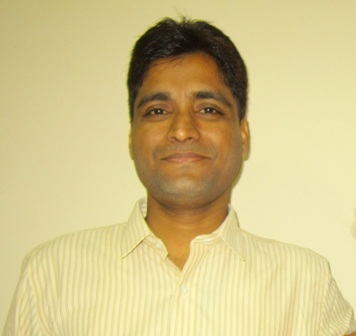
Suresh Kumar Podishetti knows what it takes to be a successful investor in India. His blog, My Investment Ideas, offers readers information on the types of investments that they should consider making regardless of income level.
Suresh provides his wealth of knowledge in this interview.
Duke Revard: Your website offers a variety of investment options in India and other money-saving tips. Describe your background in this industry.
Suresh Kumar Podishetti: I have over 15 years of experience in financial markets, where I analyze various investment options and money saving ideas in India. I analyze various investment options like mutual funds, IPOs, insurance plans, tax-free bonds, non-convertible debentures (NCD’s), etc.

Duke Revard: What are some of the most common questions you’re asked regarding investment options?
Suresh Kumar Podishetti: Investors are often confused with the various investment options available. Investors keep checking the details of investment options that are suitable to them, how long they need to invest, how such options score highly for them among other alternatives available, etc.
Duke Revard: What kind of tips can you offer those new to investing as well as old pros? How do these tips differ?
Suresh Kumar Podishetti: For new investors, I would advise that they should not invest in a hurry. They need to understand various options, which ones are best-suited for them, and for how long they are prepared to invest their money.
For the seasoned investor, they may not have any basic doubts, but instead are more likely to know about the analysis from professionals before they proceed to make an investment.
When I start writing my analysis in the form of an article, I would consider investors’ requirements and what kind of questions or queries they might ask. My blog is successful because of my simple and complete analysis of frequently asked questions.
Duke Revard: While trends change all the time, what are some of the most solidly-performing stocks and/or mutual funds?
Suresh Kumar Podishetti: While I do analysis on stocks, I generally do not give recommendations on stocks. Mid-cap/Small mutual funds have been performing well in the Indian stock market boom. Sundaram Smile Fund, Reliance Small cap, Franklin India, and some smaller companies are some of the funds which have outperformed in the last year. Investors have doubled their money by investing in such funds within a year.
Duke Revard: What kinds of investments do you recommend? For instance, should individuals invest in the stock market or look to other avenues to grow money?
Suresh Kumar Podishetti: This depends on the individual’s risk appetite. High-risk investors can invest in stocks, mutual funds, corporate fixed deposits, NCD’s, etc. Moderate-risk investors can invest in large cap and hybrid mutual funds, secured NCDs, bank fixed deposits, etc. Low-risk investors can invest in hybrid mutual funds, bank fixed deposits, and post office saving schemes.
Duke Revard: Talk to us about some money-saving ideas that are beneficial to those who invest as well as everyone else.
Suresh Kumar Podishetti: I look at money-saving ideas in three parts.
1. Whatever you earn, you should be able to save a decent amount as savings. Your savings should not be less than 20% of your total earnings in a month. Over a period of time, such savings should be increased to 50% to 70%. I am not saying you should not spend, but you should increase your total income and reduce spending so that your savings are increased automatically without compromising on expenses. I have recommended several money-saving ideas on our blog which are simple and can be implemented in no time.
2. Whatever you invest, you should spend less costs on investing. For investing in mutual funds, an investor can invest through Direct Plans and increase their returns by 1% to 2%. One can open a dematerialized account or mutual fund account with stock brokers which are offered at a lower cost or free of charge.
3. Your savings should be put into investment options that are best suited to your needs. Often, I see that investors stick to bank fixed deposits due to a lack of awareness. Myinvestmentideas.com focuses on creating awareness so that investors can select the options that is best suitable to them. Our blog is able to influence thousands of investors to invest in mutual funds.
Duke Revard: What is the biggest recommendation you give to those looking to grow their portfolio?
Suresh Kumar Podishetti: My simple recommendation is to keep investing for the long term. In the short term, you can just accumulate money but cannot grow money. For instance, the HDFC Prudence Mutual fund in India has given 20% annualized returns in the last 10 years and outperformed Indian stock market. This is the power of investing for the long term.
Duke Revard: Talk about any issues surrounding fixed-incomes and investments or investing.
Suresh Kumar Podishetti: While there are several fixed income options like company fixed deposits, NCDs, and bank fixed deposit schemes available in the market, investors often prefer bank fixed deposits. Though corporate fixed deposits or NCDs offer interest rates between 9% to 13% per annum, many companies are delaying the payment of interest and repayment of principal investment amounts. I feel that either the Securities Exchange Board of India (SEBI) or the Ministry of Corporate Affairs in India should adopt strict guidelines to reduce such delays so that high-risk investors can invest in such companies.
Duke Revard: What are some of the best-performing stocks or mutual funds, now and historically?
Suresh Kumar Podishetti: While I do analysis on stocks, I generally do not give recommendations on stocks. In the mutual funds segment, there are several top mutual funds in India where one can invest. My favorite mutual funds are the ICICI Focused blue chip fund and the Birla SL Frontline Equity fund in the large cap segment. In the mid-cap segment, I found that the HDFC Mid-cap Opportunities Fund and the Franklin India Smaller companies fund are top performers. In the Hybrid/Balanced funds segment, I prefer the HDFC Prudence and ICICI Balanced funds which are consistent performers in the long run. I always recommend to investors that while investing in mutual funds, they should invest through the Systematic Investment Plan (SIP) for a term of at least 8 to 10 years to get good returns.
Duke Revard: Please share anything else you would like readers to know about investing.
Suresh Kumar Podishetti: My mantra is simple. Invest as much as you can for the long term in the investment option that is most suitable to you. If you can keep this in mind, you can achieve their financial goals faster than you think.






